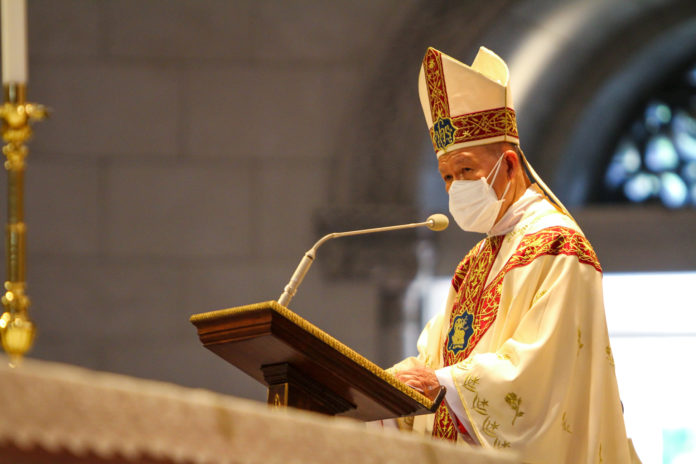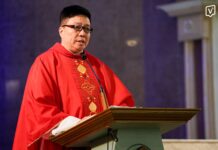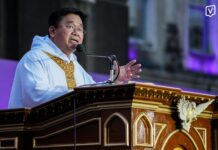
THOMASIAN Cardinal Jose Advincula vowed to be a “listening shepherd” to the Manila flock during his installation as the 32nd Roman Catholic archbishop of Manila on Thursday, June 24, at the Manila Cathedral.
“My beloved brothers and sisters in Christ, I have nothing new to tell you today except my commitment to renew my heart’s desire to be a listening shepherd to the flock entrusted to my care,” Advincula said in his first homily as head of the archdiocese.
“Audiam” or “I will listen” is Advincula’s episcopal motto, which was derived from the young Samuel’s response to the call of God from the Old Testament, “Speak Lord, your servant is listening.”
Echoing Pope Francis, he said being a “listening shepherd” means listening to every member of Christ’s flock, especially the “lamb” or the youth and those belonging to the peripheries.
“It is my ardent desire to listen to all but especially to the lambs which represent our youth and other people in the peripheries; because of less attention given them by the Church, their faith is as fragile as the health of a lamb – they are the first target of the marauding wolves. I cannot feed my flock unless I listen first to their needs, their longings,” Advincula said.
Capiz to Manila
The 69-year-old cardinal said that he thought he would spend his remaining years in the Archdiocese of Capiz, where he had served for nine years.
“But in a mysterious fashion, God has called me to get away from my comfort zone, and serve Him in a manner far beyond my expectations. And it demands of me a lot more than I can give if I am to shepherd His flock after His own heart,” he said.
Before being promoted to the rank of cardinal in November 2020, Advincula was the archbishop of Capiz, a post he took over in 2012.
He was bishop of San Carlos in Negros Occidental from 2001 to 2011.
He was born on March 30, 1952 in Dumalag, Capiz and was ordained priest for the Archdiocese of Capiz on April 14, 1976.
In 1995, he served as rector of the St. Pius X Seminary in Roxas City, Capiz. He became parish priest of St. Thomas of Villanova Parish in Dao, Capiz in 1999.
‘We are with you in this journey’
Cardinal Luis Antonio Tagle, Advincula’s predecessor, reminded the new Manila archbishop to be true to himself while serving the Catholics in the archdiocese.
“Joe, just be who you are. Ang tinawag ng Diyos, ikaw; at ang maglilingkod ay ikaw, at ang ibibigay mo sa napakabuhay na Sambayanan sa Arkidioyesis ng Maynila ay ikaw. Ikaw ang biyaya ng Diyos,” Tagle said in a video message from Rome.
In a video message, former Manila archbishop Cardinal Gaudencio Rosales told Advincula to also pray for the various people he would encounter in the metropolitan cities.
“Manila is a very intricate place — the kaleidoscope of socio, economic, political, ideological and inter-cultural is present in Manila. [Manila] is a new and challenging world. Many are with you and many are waiting for you,” Rosales said.
The Archdiocese of Manila is known as the Philippines’ premiere see, which covers five highly urbanized cities — Manila, Makati, Pasay, Mandaluyong and San Juan.
The apostolic nuncio to the Philippines, Archbishop Charles Brown, also wished Advincula “many years of shepherding this flock” and promised “unwavering support” and their “fervent prayers” for his mission.
Manila Auxiliary Bishop Pabillo said the appointment of Advincula was an answered prayer.
“Do not be afraid. We are ready, as always, to cooperate and collaborate with our shepherds. You are not in this alone,” Pabillo said.
Advincula and Brown both expressed their gratitude to Pabillo for administering the archdiocese over the past 16 months.
“He was able to steer the wheel, and manage the archdiocese until today when it is being transferred to my management. Thank you very much Bishop Pabillo for the work well done,” Advincula said.
God’s perfect timing
While the Covid-19 pandemic has “held us hostage for a year and half already,” Advincula said the date of his canonical possession happened “in God’s time.”
He said God’s mysterious design made his installation an event of “great historic significance,” citing three reasons.
First, his appointment as Manila archbishop was made during the Year of St. Joseph, his personal saint and namesake.
Second, this year marks the 500 years of the arrival of Christianity in the country. Advincula stressed the importance of “missio ad gentes” (mission to the nations), reminding the faithful that they were “gifted to give.”
Third, his installation coincided with the 450th founding anniversary of the City of Manila and the Feast of St. John the Baptist, whose “total and unconditional trust to God” Advincula aims to emulate.
Before the Eucharistic celebration, Advincula was welcomed by Manila Mayor Francisco “Isko” Moreno Domagoso, Pabillo, and other officials at the Postigo Gate of Intramuros.
The historic gate was reserved for the highest authority in the country, the governor general and the archbishop of Manila during Spanish colonial times.
At the Ayuntamiento de Manila, the city mayors under the Archdiocese of Manila handed over the symbolic keys to their cities to Advincula.
The crozier that Advincula used during the installation originally belonged to Archbishop Artemio Casas, also a Thomasian and the first rector of the postwar Manila Cathedral. Casas became the first bishop of Imus and later on Archbishop of Jaro.
The crozier symbolizes Advincula’s pastoral function in the local Church and role as “shepherd of the flock of God.”
Only 400 attendees were allowed inside the Manila Cathedral during the event in accordance with Covid-19 health protocols.
The rites was streamed live on the Facebook pages and Youtube channels of the Archdiocesan Office of Communications, TV Maria, Radio Veritas, Manila Cathedral, CBCP News, and all the parishes of the Archdiocese of Manila.
Advincula is the first Manila archbishop who was already a cardinal prior to his installation.
Seven days before his installation, Brown bestowed the cardinal’s insignia to Advincula, marking the first time in Philippine history that a Filipino cardinal received the insignia in his home country instead of the Vatican. Ma. Alena O. Castillo and Christine Joyce A. Paras













